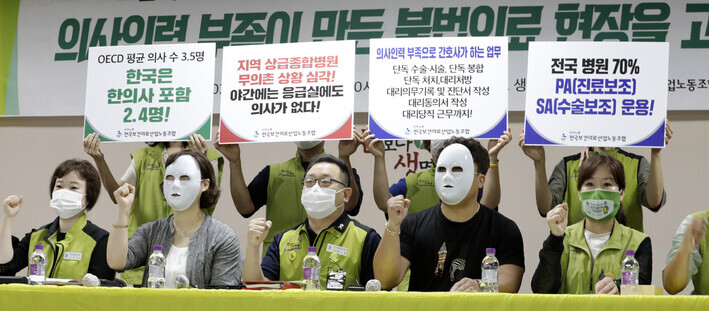hankyoreh
Links to other country sites 다른 나라 사이트 링크
[Reportage] Physician assistants required to roles of doctors amid medical staff shortage

“In 2009, our hospital hired just 19 physician assistants [PAs] and nurses for departments that were short on residents, including OB/GYN and surgery,” explained “A,” a nurse with over 23 years of experience working at a tertiary hospital. “Since the implementation of a medical resident act limiting resident training hours to a maximum of 80 per week, that number has grown to 66. There are departments where PAs are not only performing the surgery assistance that interns should be providing, but also doing things like applying sutures after operations.
“The fact that we’ve hired 66 PAs basically means that we really needed 66 physicians to do those jobs.”
On the eve of a strike organized by residents, health and medical workers with the Korean Health and Medical Workers’ Union (KHMWU, affiliated with the Korean Confederation of Trade Unions) held a press conference on Aug. 6 to decry a healthcare environment where nurses -- referred to as “physician assistants,” or “PAs” -- are illegally tasked to perform the duties of doctors. According to the union’s accounts, the job of a PA has been arbitrarily assigned by large general hospitals to alleviate a shortage of physicians amid a cap in the number of medical college admissions over the 20 years since the official division of medical roles and responsibilities in 2000.
Typically, PAs come from nurses, emergency rescue workers, and medical technicians who are transferred to meet hospital staffing demands. The KHMWU estimates that around 10,000 health and medical workers are currently working as PAs at hospitals throughout South Korea.
PAs writing prescriptions, performing diagnoses, even performing surgeryAccording to the findings of a survey of 29 hospitals nationwide last year, PAs have been filling the gap created by the shortage of physicians by performing duties such as minor surgeries, writing prescriptions, and performing diagnoses and drafting surgery consent forms. PAs have also been filling in for physicians while they are absent for holidays and other reasons. Another tertiary hospital nurse speaking at the press conference that day said, “A nurse at our hospital recently faced accusations after performing echocardiography testing and diagnosis at the hospital’s direction.”
“It has become routine for the hospital to give nurses a physician’s ID and password and force them to issue prescriptions, or to get nurses to provide surgery consent forms and then forge the name of the supervising physician in the ‘attending surgeon’ blank,” the nurse said.
Arguing that hospitals’ arbitrary use of PAs -- who are not mentioned in the Medical Service Act – poses a threat to patient safety, the union called for raising the cap in the medical school admissions and for the establishment of new health service colleges. Park No-bong, senior vice chairperson of the KHMWU, stressed, “We need a historic increase in physicians to eradicate illegal medical practices.”
Health minister calls for renewed dialogue with Korea Medical AssociationMeanwhile, Minister of Health and Welfare Park Neung-hoo called the same morning for renewed dialogue with the Korea Medical Association (KMA), which has announced plans to begin a strike on Aug. 14 in opposition to raising the cap on medical school admissions.
“We need to refrain from collective action and resolve the issue through dialogue and discussions,” Park urged. The day before, the KMA declined a meeting with the Ministry of Health and Welfare (MOHW), stating that it planned to speak with the Office of the Prime Minister instead. On the afternoon of Aug. 6, Vice Minister of Health and Welfare Kim Kang-lip held a closed-door meeting with the Korean Intern Resident Association to discuss matters including improved training environments for residents.
At the same time, the MOHW downplayed the likelihood of the residents’ strike on Aug. 7 having serious repercussions.
“Professors and fellows will be able to fill in for the duties of interns and residents, so it does not appear that there will be any major difficulties in treatment, apart from the possibility of larger wait times,” said MOHW Spokesperson Son Young-rae.
By Seon Dam-eun and Hwang Ye-rang, staff reporters
Please direct comments or questions to [english@hani.co.kr]

Editorial・opinion
![[Column] Life on our Trisolaris [Column] Life on our Trisolaris](https://flexible.img.hani.co.kr/flexible/normal/500/300/imgdb/original/2024/0505/4817148682278544.jpg) [Column] Life on our Trisolaris
[Column] Life on our Trisolaris![[Editorial] Penalties for airing allegations against Korea’s first lady endanger free press [Editorial] Penalties for airing allegations against Korea’s first lady endanger free press](https://flexible.img.hani.co.kr/flexible/normal/500/300/imgdb/original/2024/0502/1817146398095106.jpg) [Editorial] Penalties for airing allegations against Korea’s first lady endanger free press
[Editorial] Penalties for airing allegations against Korea’s first lady endanger free press- [Editorial] Yoon must halt procurement of SM-3 interceptor missiles
- [Guest essay] Maybe Korea’s rapid population decline is an opportunity, not a crisis
- [Column] Can Yoon steer diplomacy with Russia, China back on track?
- [Column] Season 2 of special prosecutor probe may be coming to Korea soon
- [Column] Park Geun-hye déjà vu in Yoon Suk-yeol
- [Editorial] New weight of N. Korea’s nuclear threats makes dialogue all the more urgent
- [Guest essay] The real reason Korea’s new right wants to dub Rhee a founding father
- [Column] ‘Choson’: Is it time we start referring to N. Korea in its own terms?
Most viewed articles
- 1New sex-ed guidelines forbid teaching about homosexuality
- 260% of young Koreans see no need to have kids after marriage
- 3OECD upgrades Korea’s growth forecast from 2.2% to 2.6%
- 4[Column] Life on our Trisolaris
- 5[Guest essay] Maybe Korea’s rapid population decline is an opportunity, not a crisis
- 6Presidential office warns of veto in response to opposition passing special counsel probe act
- 7S. Korea discusses participation in defense development with AUKUS alliance
- 8Two lung cancer deaths at Samsung Electronics deemed occupational in nature
- 9Trump asks why US would defend Korea, hints at hiking Seoul’s defense cost burden
- 10Inside the law for a special counsel probe over a Korean Marine’s death